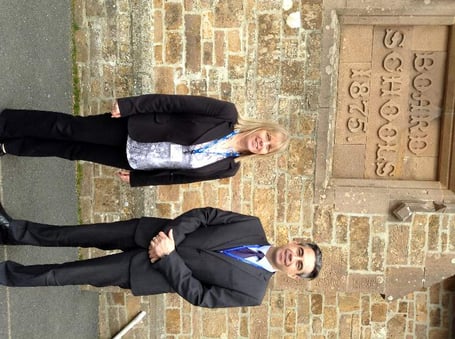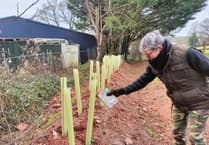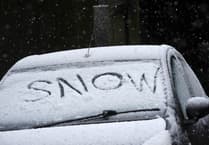In one of the classrooms Alan Monger takes me to at Hatherleigh Primary School, the children are writing letters to him. ‘We need £20,’ explained one little boy. ‘This is Year 2 and they are doing an enterprise project so they need to write me a persuasive letter asking for money,’ explained his new headteacher. ‘It’s a loan,’ qualified their class teacher.
Closer inspection of one of the handwritten letters reveals the class to be organising a trip to the seaside.
It sounds like a plan. In fact it already is, because new head Alan, who took over the reins at the 190-pupil primary school at the start of the summer term, is hoping to run whole school trips to the coast in future. It is an idea he has brought with him from his previous school in Hereford, where he was deputy headteacher.
‘We have already planned a whole school walk,’ he said. ‘It takes a little while to organise things but we are hoping to take the whole school on a trip next year.’
Alan, who has moved to Devon for the job, has taken over the reins from previous headteacher Caroline Boother, who moved onto pastures new at Easter, and says he is settling in already.
His previous school, Holy Trinity Primary School in Hereford, had more than 600 pupils. Hatherleigh Primary, at about a third of that, is the perfect size, he said, being neither too small or too large.
‘It is going really well and is everything I was hoping it was going to be,’ he said. ‘It is a good size. We have one year group per class.
‘I was acting head at my last school but this is my first headship. I saw this one advertised and thought this looks rather nice and it all went from there.
‘I’ve moved down already and the family are on their way.’
He seems very proud of his new domain. I am shown the classrooms, greeting teachers and their small, busy charges, and we also put our heads around the door of a one-to-one lesson on the drums.
We continued on to tour the grounds, including the school garden, sports hall, a playing field with sports pitches and even an amphitheatre and storyteller’s chair in the woods, created by the school’s parents, teachers and friends association.
‘When I came down here one day, I found [teacher] Mr Pearson reading some Shakespeare and all the children were sitting listening.
‘We like to bring them down here, especially during the summer months when we bring our classes here and have a story.
He added: ‘In the summer holidays all this just sits here. We want to encourage people to make the absolute most of it.
‘It is very much a community school and it has a family feel to it, so I would like to build on that, making it a hub for the community.
He said his priority was quite simple. — it’s the children. ‘It always comes down to what is best for them,’ he said, ‘always, always.
‘Children’s well-being is absolutely vital and I want children to be happy and secure.
‘I think Hatherleigh is a very very good school so my job is really about maintaining and building on those standards,’ he added. ‘My vision is to provide best quality teaching and learning for Hatherleigh and the surrounding areas and maintain and build on all the good practice that is here already.
‘Certainly the new development in Hatherleigh [on the market site] is going to have a positive impact on us and bring families and children into the school which will be really great.
‘My aim is that the school be one they want to send their children to.’
Alan shares general concerns that with so much emphasis on testing in schools, there are worries generally about children missing out on other things.
‘All the extra-curricular clubs and activities we do are so important. If you think back to your own school days, you don’t remember the time doing tests, you remember the time when you represented the school at sport or were in a school production, when you went to the seaside or on a Year 6 residential trip and went canoeing and climbing. Those memories are important.
‘It is important, for instance, that we have visitors to the school. We have got a theatre group coming in soon.’
After-school clubs are run by the staff.
‘I can’t ask the staff to stay on and run those but they give up their time to do these things because they think they are important.
‘It is those extra things that enrich the curriculum. Yes, we have got tests and we want the children to do their very best at those and high standards are essential but it is very much a case of doing that through a full curriculum.’
Asked what challenges he faces, he doesn’t hesitate.
‘Funding is definitely a challenge, ever tightening budgets, and it is very much about making the most of funding and making sure that every decision we make has a positive impact on our children.
‘If we are doing something we ask ourselves why we are doing it, what impact will it have on the children.That is very important because at the end of the day that is why we are doing it.
‘I want to make sure that from when they join in reception to when they leave after Year 6 that they make the most progress that they possibly can and build up resilience for whatever they go onto.’





Comments
This article has no comments yet. Be the first to leave a comment.